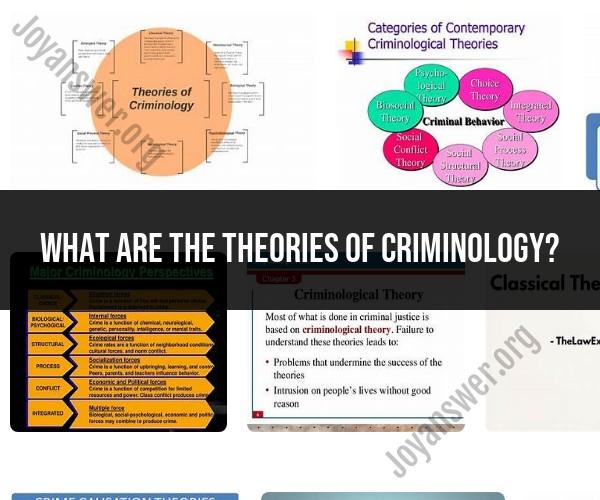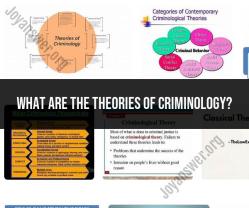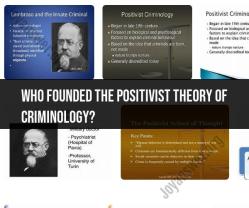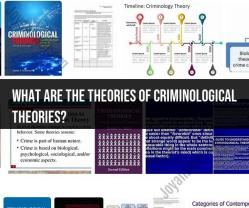What are the theories of Criminology?
Criminology is the study of crime, criminal behavior, and the factors that influence criminal activity. There are several major theories of criminology, each with its own perspective on why individuals engage in criminal behavior. These theories provide different explanations and insights into the causes of criminal activity. Here are some of the prominent theories of criminology:
Classical Criminology:
- This theory, often associated with Cesare Beccaria and Jeremy Bentham, emphasizes that individuals make rational choices when deciding whether to commit a crime. It suggests that people weigh the potential benefits and consequences of their actions. Therefore, to deter crime, the focus should be on ensuring swift, certain, and proportionate punishments.
Positivist Criminology:
- Positivist theories, such as the biological, psychological, and sociological perspectives, argue that criminal behavior is not solely a result of rational choice but is influenced by factors beyond an individual's control. These theories look at the role of biology, mental health, and social environment in shaping criminal behavior.
Biological Theories:
- Biological theories propose that factors such as genetics, brain structure, and hormonal imbalances can contribute to criminal behavior. For example, some researchers have explored the influence of genetics and the "warrior gene" on aggression and criminality.
Psychological Theories:
- Psychological theories examine how an individual's mental and emotional state can contribute to criminal behavior. For instance, psychodynamic theories suggest that unresolved conflicts from childhood can lead to criminal acts, while cognitive theories focus on how cognitive processes and thinking patterns can play a role.
Sociological Theories:
- Sociological theories look at how social factors and environmental influences can lead to criminal behavior. Some prominent sociological theories include:
- Strain Theory: Robert Merton's theory suggests that individuals turn to crime when they are unable to achieve societal goals through legitimate means.
- Social Learning Theory: This theory, associated with Albert Bandura, posits that individuals learn criminal behavior through interactions with others.
- Social Control Theory: Travis Hirschi's theory argues that people are less likely to engage in criminal behavior when they have strong social bonds and attachments to society.
- Labeling Theory: This theory explores how the labeling of individuals as criminals can lead them to engage in further criminal activities due to societal reactions.
- Sociological theories look at how social factors and environmental influences can lead to criminal behavior. Some prominent sociological theories include:
Routine Activities Theory:
- Developed by Lawrence E. Cohen and Marcus Felson, this theory suggests that crime occurs when three elements coincide: a motivated offender, a suitable target, and a lack of capable guardianship. Changes in these factors can affect the likelihood of criminal activity.
Life Course Theory:
- This theory examines how criminal behavior evolves over a person's life. It looks at factors such as childhood experiences, transitions, and social bonds that can influence the likelihood of engaging in criminal activities at different life stages.
Control Balance Theory:
- Developed by Charles Tittle, this theory proposes that individuals seek to maintain a balance between control and freedom in their lives. Deviance or criminal behavior may occur when this balance is disrupted.
These theories of criminology are not mutually exclusive, and many researchers and practitioners draw on multiple theories to better understand criminal behavior. Understanding these theories can help law enforcement, policymakers, and social workers develop more effective strategies for crime prevention and rehabilitation.
Overview of Criminological Theories
Criminological theories attempt to explain why crime and criminal behavior occur. They are based on a variety of disciplines, including sociology, psychology, and economics.
There are many different criminological theories, but they can be broadly divided into two categories: macro-level and micro-level theories. Macro-level theories focus on the social and economic factors that contribute to crime, while micro-level theories focus on the individual characteristics and experiences that are associated with crime.
Major Schools of Thought in Criminology
There are three major schools of thought in criminology: classical, positivist, and critical.
- Classical criminology: Classical criminologists believe that crime is a rational choice made by individuals who weigh the potential benefits and costs of criminal activity. They believe that the best way to deter crime is through punishment.
- Positivist criminology: Positivist criminologists believe that crime is caused by factors beyond the individual's control, such as poverty, social inequality, and mental illness. They believe that the best way to reduce crime is through social reform and rehabilitation.
- Critical criminology: Critical criminologists believe that crime is a product of capitalism and other forms of oppression. They argue that the criminal justice system is unfair and disproportionately targets marginalized groups.
Key Theories in Criminology: From Classical to Modern
Some of the key theories in criminology include:
- Classical theory: Cesare Beccaria and Jeremy Bentham developed classical theory in the 18th century. They argued that crime is a rational choice made by individuals who weigh the potential benefits and costs of criminal activity. They believed that the best way to deter crime is through punishment.
- Positivist theories: Positivist theories emerged in the late 19th century and early 20th century. They focus on the individual and social factors that contribute to crime. Some of the most influential positivist theories include biological theories, psychological theories, and social learning theory.
- Critical theories: Critical theories emerged in the mid-20th century. They focus on the social and economic factors that contribute to crime, such as poverty, inequality, and discrimination. Some of the most influential critical theories include conflict theory, labeling theory, and feminist criminology.
Applications and Relevance of Criminological Theories
Criminological theories are used in a variety of ways, including:
- To inform crime prevention and intervention programs: Criminologists use their research to develop programs that are designed to prevent crime and rehabilitate offenders.
- To develop public policy: Criminologists can help policymakers to develop effective crime control and prevention strategies.
- To educate the public: Criminologists can help the public to understand the causes and consequences of crime.
Evolving Perspectives on Crime and Criminal Behavior
Criminological theories are constantly evolving as new research is conducted and new social conditions emerge. For example, in recent years, there has been a growing interest in the role of technology in crime and the impact of mass incarceration on crime rates.
Criminologists are also increasingly focusing on the experiences of victims of crime and the ways in which crime can impact communities.
Overall, criminological theories provide a valuable framework for understanding why crime and criminal behavior occur. They can be used to inform crime prevention and intervention programs, develop public policy, and educate the public.





